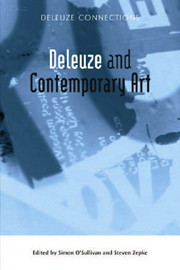Book contents
- Frontmatter
- Contents
- Acknowledgements
- List of Illustrations
- Introduction: Deleuze and Guattari and Contemporary Art
- POLITICS
- THE AESTHETIC PARADIGM
- SCENES AND ENCOUNTERS
- TECHNOLOGIES
- 13 Sign and Information: On Anestis Logothetis' Graphical Notations
- 14 Anti-Electra: Totemism and Schizogamy
- 15 Unimaginable Happenings: Material Movements in the Plane of Composition
- 16 BLOODCRYSTALPOLLENSTAR
- Notes on Contributors
- Index
14 - Anti-Electra: Totemism and Schizogamy
from TECHNOLOGIES
Published online by Cambridge University Press: 12 September 2012
- Frontmatter
- Contents
- Acknowledgements
- List of Illustrations
- Introduction: Deleuze and Guattari and Contemporary Art
- POLITICS
- THE AESTHETIC PARADIGM
- SCENES AND ENCOUNTERS
- TECHNOLOGIES
- 13 Sign and Information: On Anestis Logothetis' Graphical Notations
- 14 Anti-Electra: Totemism and Schizogamy
- 15 Unimaginable Happenings: Material Movements in the Plane of Composition
- 16 BLOODCRYSTALPOLLENSTAR
- Notes on Contributors
- Index
Summary
Which path leads back to the pre-Oedipal, back to the universe of the primal Mother, the mother as the world? Freud bracketed the continent of the pre-Oedipal out of psychoanalytical theory, considering it a sphere without words or concepts. Indeed, one is always already expatriated; one has already emigrated when one begins thinking about it. For this simple reason the pre-Oedipal rose to become the greatest field of projection for feminist psychoanalysis, onto which was pinned the hope that it could, as an ancestral and prior continent, be (re)conquered exclusively by means of a feminine logic. Its mythical nature has lent itself to many interpretations: it is often projected as a Golden Age representing lost experiences of oneness and bliss; or, it serves as an ontological frame for the construction of a non-castrated, unpunished ‘phallic’ mother. But it's hard to accept this ‘non-castrated mother’ because in this super-dialectic she stands for a perverse logic of loss, that is, for the loss of the Oedipal in the pre-Oedipal as seen from the nostalgic standpoint of the Oedipalised. For the concept of the mother can only appear ‘non-castrated’ from the perspective of loss (from the perspective of an internalised castration) that looks back to a phantasmatic and original possession.
- Type
- Chapter
- Information
- Deleuze and Contemporary Art , pp. 246 - 265Publisher: Edinburgh University PressPrint publication year: 2010

